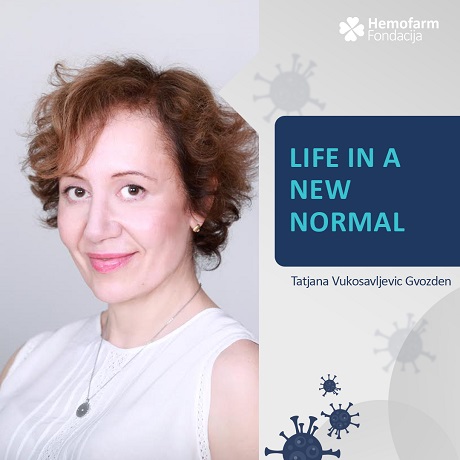
06/05/2020
Life in a New Normal
Prof. dr. Tatjana Vukosavljević Gvozden
Department of Psychology, Faculty of Philosophy, Belgrade
Life in a New Normal
After nearly two months of the state of emergency, introduced due to the coronavirus pandemic, the number of those infected is decreasing and it is expected to gradually return to the normal way of life. In addition to fear of coronavirus infection, we face uncertainty - what will our economic situation be like, what will our relationships with other people look like, what will our children's lives look like?
A group of psychologists from the Department of Psychology at the Faculty of Philosophy in Belgrade tried to determine what we are most afraid of and what contributes to those fears, ranging from personality characteristics to the experience that we may or may not rely on the closest environment and various institutions of the system. The sample consisted of more than 1400 adults, most of them highly educated, employed and having children.
The results show that during this period the respondents are more afraid of the possible consequences of the pandemic than whether they would be infected with the coronavirus themselves. About two-thirds of the respondents are most afraid of their family's poor financial condition, followed by fear of losing their jobs, the effects of the pandemic on mental health and social relationships. Almost a half of the respondents fear that their living conditions will deteriorate permanently. Parents have many fears about their children, most about their future health but also about their schooling, mental health...
Three quarters of our respondents have a medium or high level of distrust in the media (TV, radio, newspapers). Two-thirds of respondents demonstrate a medium or high level distrust in the work of the Government, the Crisis Staff comprised of epidemiologists and, to a lesser extent, in the functioning of healthcare institutions. When it comes to doctors and medical staff, two-thirds of respondents trust them. The majority of respondents find emotional and other support only in the closest circle of people - parents, partners and friends.
The intensity of anxiety about a possible coronavirus infection and consequences of the pandemic depends more on the psychological characteristics of the respondents than on the support they receive from their immediate and wider social environment. People who are less tolerant of uncertainty and focus on dysfunctional care are more prone to developing various pandemic-related anxieties. This kind of care typically consists of negative catastrophic thoughts (‘What if ...?’) that branch in many directions and thus prevent the person from focusing on constructively finding a solution to a particular problem. Intolerance of one's own negative feelings, encouraged by stressful situations, is increased by the anxiety caused by the coronavirus and the consequences of the pandemic. Considering what is said, people who are most prone to developing emotional disorders need help to improve their acceptance of uncertainty and their own negative feelings and increase their capacity to solve problems.
Although slightly less significant than individual factors, social factors are also associated with the development of pandemic-related anxiety and its consequences. In stressful situations such as this, reliable and timely information is a factor that has a positive effect on reducing anxiety. Our citizens' fears would be less if they had more confidence in the work of the Government, various institutions of the system and the media. In this way, with healthy concern, but without harmful anxiety, we could focus on solving the many problems that await us in the time to come.
We can ask ourselves what can we do in such a stressful situation whose duration we cannot predict? Although anxiety is a natural and adaptive reaction when faced a threat and danger and its purpose is to mobilize us and help us take appropriate action, dysfunctional anxiety and excessive worry can exhaust us and interfere with our functioning. In psychotherapy, it is believed that the way we look at events can significantly influence our reaction so that changing from dysfunctional to functional thinking would be of great benefit. One of the frequent hindering ways of thinking involves catastrophizing or anticipating the worst-case scenarios and underestimating our own ability to face them. It is necessary, first of all, to distinguish the meaning of the expression ‘possible’ from the expression ‘probable’ and to realistically assess the probability of a catastrophic scenario (e.g. ‘It is possible that I will lose my job, just like everything else is possible, bit how probable is it?‘). We can then determine what internal and external resources we can use to deal with the catastrophic scenario if it does happen (e.g. ‘What are all the options available to me if I lose my job?’). Events cannot always be predicted and controlled, so it is very important to adopt the philosophy of accepting uncertainty as an integral part of life and strengthen the belief that we can endure negative outcomes and problematic situations and persistently search for ways to solve them.
People who believe that it is useful to wory about adverse future events, because they can predict and control them by doing so, should understand that excessive worry mainly ruins our mood and prevents us from dealing with practical problem solving. Although in stressful situations it is natural to worry about unfavorable possibilities, we can control the degree to which this happens - as the famous saying goes: ‘We cannot prevent birds from flying around our heads, but we can prevent them from making a nest in our hair.’ One solution is to limit the amount of time we spend reading the news (e.g. 30 minutes a day), with the recommendation to choose the source of information very carefully.
Research also indicates that regular physical exercise has a beneficial effect on reducing tension and it can be done indoors and outdoors – depending on the circumstances. Diaphragmatic breathing (slow, abdominal breathing) in combination with progressive muscle relaxation exercises (alternating tension and relaxation in different parts of the body) is also useful for reducing physical tension, and there is a lot of literature available online.
Pleasant events improve our mood so it is important that we do the things we enjoy. Therefore, everyone should think about what they enjoy and indulge in such activities on a daily basis (e.g. listening to music, watching their favorite movies, organizing social events live or online). In the future, we are likely to be confronted with the abolition or restriction of some of the important activities that have a positive effect on our mood (such as: various cultural and sporting events or gatherings in larger groups, travel, etc.), which can consequently lead to dissatisfaction or increase depression of the people who are predisposed, if this situation lasts for a long time. Although we cannot change many external circumstances, by finding and pursuing activities that fulfill us, we can make the stressful periods pass in a much better mood than it would be the case if we were to passivate.
I will end with a warning regarding the amount of time we spend ‘online’. Attempting to control the spread of coronavirus involves the so-called ‘social distancing’, which, as a consequence, leads to the use of digital solutions to hold meetings, lectures, gatherings and various events. All of this can be very conducive to the development of the Internet addiction and addiction to Internet games, which, in the period preceding the occurrence of coronaviruses, had become a problem that had been widely discussed in the professional public. Although the Internet has gained prominence in this pandemic situation - as a means of gaining information, maintaining social networks and communication in general, it should not be forgotten that past research has highlighted that excessive Internet use has a negative impact on social relationships, academic and professional achievement, and it is associated with the development of depression and anxiety, especially in young people. In the coming period, we need to figure out how to take advantage of the Internet while avoiding its disadvantages.

AUTHOR
Prof. dr. Tatjana Vukosavljević Gvozden
Department of Psychology, Faculty of Philosophy, Belgrade